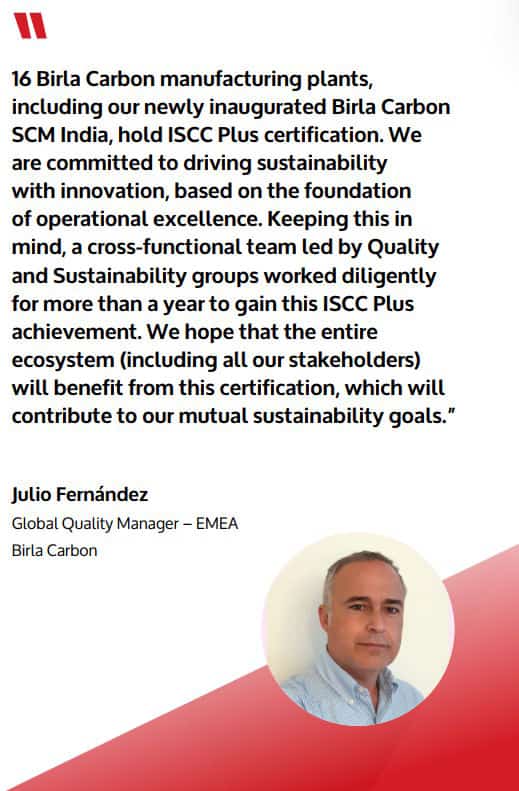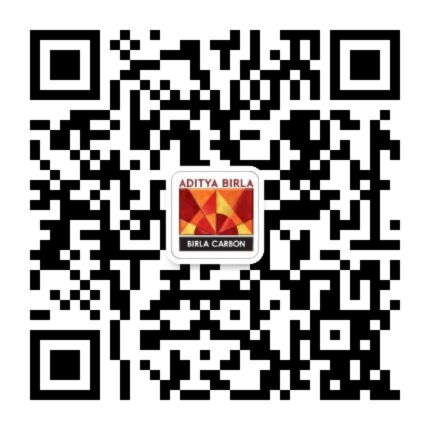Governance
Governance Mechanisms
The legal entities that comprise Birla Carbon are governed by a Board of Directors and led by our Senior Management Team (SMT). Our SMT plays a crucial role in shaping our impact on the environment, economy, and communities. The SMT ensures integrity across operations and enforces the high ethical standard expected of our employees, suppliers, customers, and communities.
Additionally, the SMT exercises risk management for Birla Carbon and oversees our sustainability efforts and progress. Our SMT engages with stakeholders, including suppliers and customers, to confirm adherence to our baseline expectations established through polices such as our Supply Chain Procurement Policy and Product Stewardship Policy. From these, we operationalize supplier due diligence and risk assessments.
Enterprise Risk Management
Our Enterprise Risk Management Committee (ERMC) consists of Birla Carbon’s leadership team and Enterprise Risk Management (ERM) functional heads. The ERMC sets the strategic direction for risk management while Regional Risk Officers and site SMEs focus on management of site risks that align with the overall strategy. Regional Risk Officers and site-specific subject matter experts develop comprehensive frameworks and guidelines that align with Birla Carbon’s overall strategy. We also engage with members from our engineering, finance, legal, IT, HR, sustainability, and other business areas to identify and mitigate risks that span across locations and functions.


Information Security
Birla Carbon is committed to constantly improving our information security practices and is focused on a “Security with Simplicity” culture. The ever-evolving threat landscape makes it essential for us to invest in the right people and technologies so we can safeguard our critical assets. At Birla Carbon, keeping our information systems and digital technology secure and operationally available with optimal performance is of extreme importance. Security is integral to our digital journey, and while we are continuously focused on preventative mechanisms, we have also built proactive mitigation mechanisms into our new technology introduction process. These strategies help us provide uninterrupted and reliable services to our customers.
Birla Carbon maintains robust information security standards across our global operations. 100% of our core infrastructure is ISO 27001 certified — including SAP, email, and other business critical applications. In addition, all Birla Carbon plants have been certified by the International Automotive Task Force (IATF), a technical standard for quality management systems in the automotive sector.
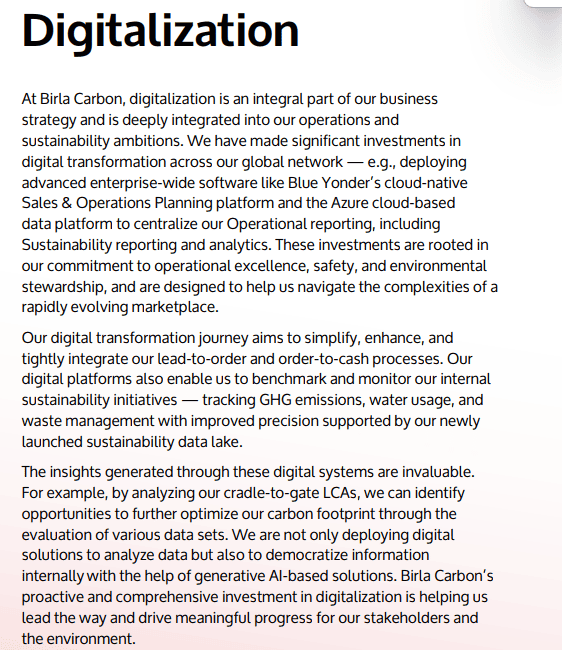
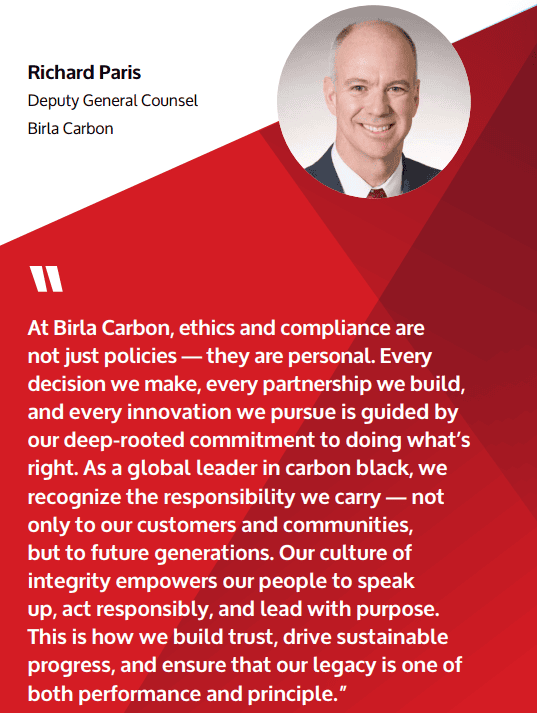
Business Ethics And Compliance
We are committed to compliance with international laws, standards, codes of conduct, and our own rigorous business principles. Compliance is also a basic stakeholder expectation. As responsible stewards of the world around us, we not only comply with all applicable laws where we operate, but we also adopt best practices and internationally recognized standards that guide our work and allow us to take greater industry leadership.
Our ethics approach addresses issues that influence our business activities: human rights, antitrust and anti-corruption, grievance measures, and collective bargaining, among others. We ensure that ethical conduct is embedded across our operations, and we expect all our employees, contracted workers, and external partners to do the same.

Supplier Due Diligence and Sustainable Procurement
At Birla Carbon, we are committed to building and maintaining a sustainable, reliable, and legally compliant supply chain. We expect our external partners to uphold the same standards of ethics, integrity, and transparency that we follow internally.
All suppliers are required to sign Birla Carbon’s Terms and Conditions of Purchase, which include a link to our Code of Ethics translated into local languages, and to comply with all applicable laws, regulations, and company policies. Our Legal Department manages these policies and reviews them regularly to ensure they remain current.
To strengthen accountability, we have established a comprehensive sustainable procurement strategy, supported by our Supply Chain and Procurement Policy, Code of Ethics, and a new Standard Operating Procedure (SOP) that formalizes how we interact with suppliers. This framework covers environmental and labor law compliance, resource conservation, renewable energy use, water stewardship, employee safety, working conditions, respect for human rights, and the elimination of child and forced labor. The sustainability, legal, and procurement teams review and amend these policies on an ongoing basis to ensure they reflect evolving standards and expectations.
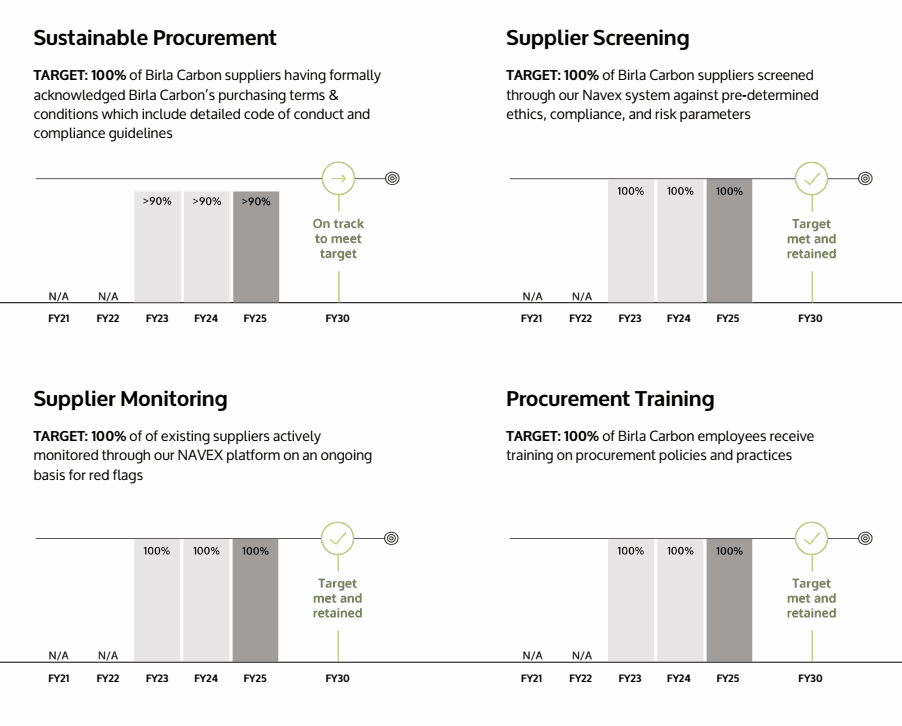
Product Responsibility
The carbon industry, which includes carbon black, carbon nanotubes, and other carbonaceous materials, is set for a transformative future as it continually evolves to enhance sustainability, efficiency, and performance through advancements in materials and processing. Ongoing innovations in the industry, such as the development of sustainable products, adoption of innovative processing technologies, and emphasis on circular economy principles in product design, are expected to drive progress toward these goals.
Additionally, the increased adoption of digitalization and automation technologies to optimize production processes and improve transparency throughout the supply chain is further propelling the industry toward a more sustainable future.
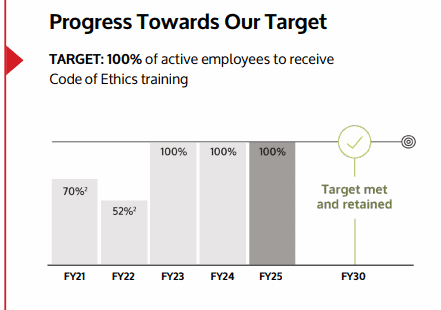


Product Safety
Birla Carbon is committed to investing in R&D so we can improve the technical and environmental performance of our products. This will help our customers meet their own high production standards and the regulatory requirements of the markets in which they operate. Our approach is based on a foundation of world-class facilities and engagement with industry peers, focusing on process innovation, product development, and product safety and stewardship.
Carbon black plays an important role in many food and human-contact applications, so product safety is a vital part of the manufacturing process. The key to this is providing robust scientific evidence that finished articles containing carbon black do not release toxic carcinogenic compounds related to polycyclic aromatic hydrocarbons (PAHs) and heavy metals. We therefore conduct both PAH and metals testing to ensure these materials are certified as being below prescribed limits. There are many methods to test for impurities in carbon black, but only one approach offers the sensitivity and selectivity needed to accurately detect PAHs. Birla Carbon has led the way in advancing standards for PAH measurement, such as helping to develop ASTM standards for the carbon black industry.
Product Quality
We aim for all our carbon black and carbon based products to deliver top quality and performance, whether used in tires, plastics, inks, or coatings. Our innovation and technology group works with our technical service teams in each region of the world to help us consistently supply carbon black to our customers with the highest levels of quality and performance, while meeting all necessary customer and regulatory requirements. These dedicated groups engage with our customers on a daily basis to ensure all their carbon black needs are met.
We report on quality-related KPIs that are communicated internally through regional and global quarterly reports: Net Promoter Score (NPS), complaints, and process reliability. These KPIs will help us continue to devise innovative solutions, improve our quality assurance (QA) processes, and strengthen our information-sharing program for quality issues.
This approach aims to prevent the recurrence of quality issues at the same or other manufacturing facilities. It also helps improve communication and awareness of quality initiatives for the benefit of all manufacturing sites.
